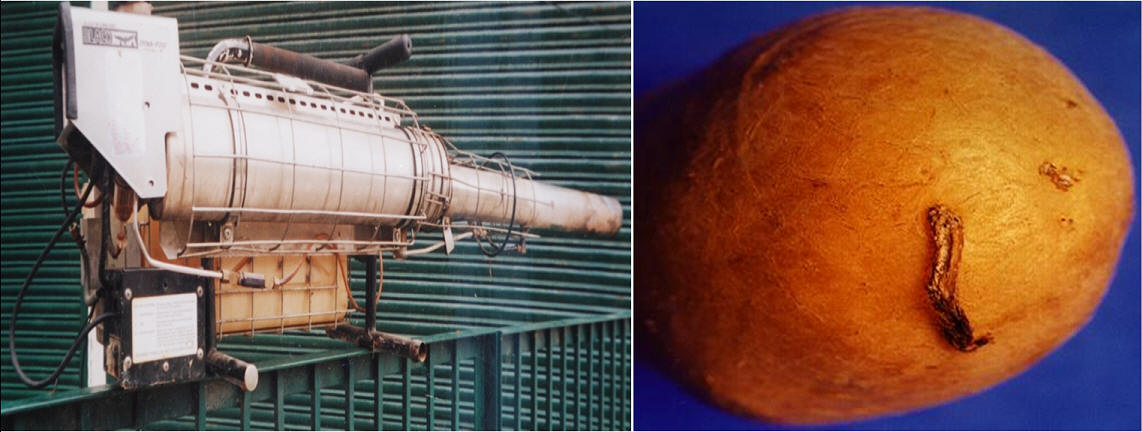
Fogging machine and a potato showing sprout burning
SPROUT SUPPRESSION
For potatoes meant to be used for table and processing purposes, sprouting is an undesirable characteristic and therefore, it is important to avoid sprouting in these potatoes. When stored at 2-4ºC sprout growth does not take place. Potatoes stored at this temperature are suitable for seed but not for ware and processing purposes. Potatoes meant for ware and processing use are stored at higher temperatures generally at 10-12ºC and at this storage temperature, sprout growth takes place which needs to be checked with some sprout inhibitor. Several sprout inhibitors have been used on potatoes world over. Some of the compounds used for checking sprout growth included several alcohols, acetaldehyde, ethylene etc. Naphthalene acetic acid (NAA) and its derivative methyl ester of alpha naphthalene acetic acid (MENA), 2-4 dichlorophenoxy acetic acid (2,4-D), 2,4,5-trichlorophenoxy acetic acid (2,4,5-T), 1,4-dimethyl naphthalene (DMN), etc have also been reported to show sprout suppression effect. Although a number of chemical sprout inhibitors have been tried, only few have gained commercial acceptance, which include Tetrachloro nitrobenzene, Maleic Hydrazide, 1,4-DMN, S-Carvone and Isopropyl-N- chlorophenyl carbamate (CIPC). CIPC is the most commonly used sprout suppressant and presently, it is the only chemical registered in India for commercial application on potatoes.
Chlorpropham (CIPC) is a mitotic inhibitor and potatoes to be treated with CIPC need to be mature and well cured. Sufficient time (2 to 3 weeks) has to be allowed after harvest for skin curing and wound healing. If CIPC is applied to potatoes with unhealed wounds, rottage can be unacceptably high. During cold storage, the potatoes are packed in bags having bigger pore size, preferably in leno bags having pore size of 8 x 8 mm or at least in Hessian cloth onion bags with pore size of 4 x 4 mm for allowing sufficient quantity of CIPC to enter the bags and get deposited on the tuber surface. Storage temperature is brought down gradually by lowering 1°C per day to 10-12°C with RH being maintained at 90-95% to minimize weight loss during storage. For treating cold stored potatoes, hot fogging concentrate (HN) formulation of CIPC is used. It can be applied in the form of fog using a fogging machine without disturbing the stored potatoes. The commercial preparation of the chemical contains 50% a.i. and 35-40 ml of this preparation is required for fogging one tonne of potatoes. However, the dose can vary depending upon the loss of fog during treatment due to leakage, the pore size of the bags used, the quantity of potatoes stored, etc. After the CIPC treatment, the store has to be kept airtight for 24-48 hours. Due to higher storage temperature, there is accumulation of CO2 in the store, which might adversely affect the quality of potatoes. Therefore, arrangement for regular flushing out of accumulated CO2 is also done to keep the CO2 concentration lower than 0.5%. First fogging is done at the first sign of sprout growth and second fogging is done at about 45 days after the first fogging. The timing of first fogging is important. If it is done at the right time, CIPC is most effective in suppressing sprout growth.
|
|
|
Fogging machine and a potato showing sprout burning |